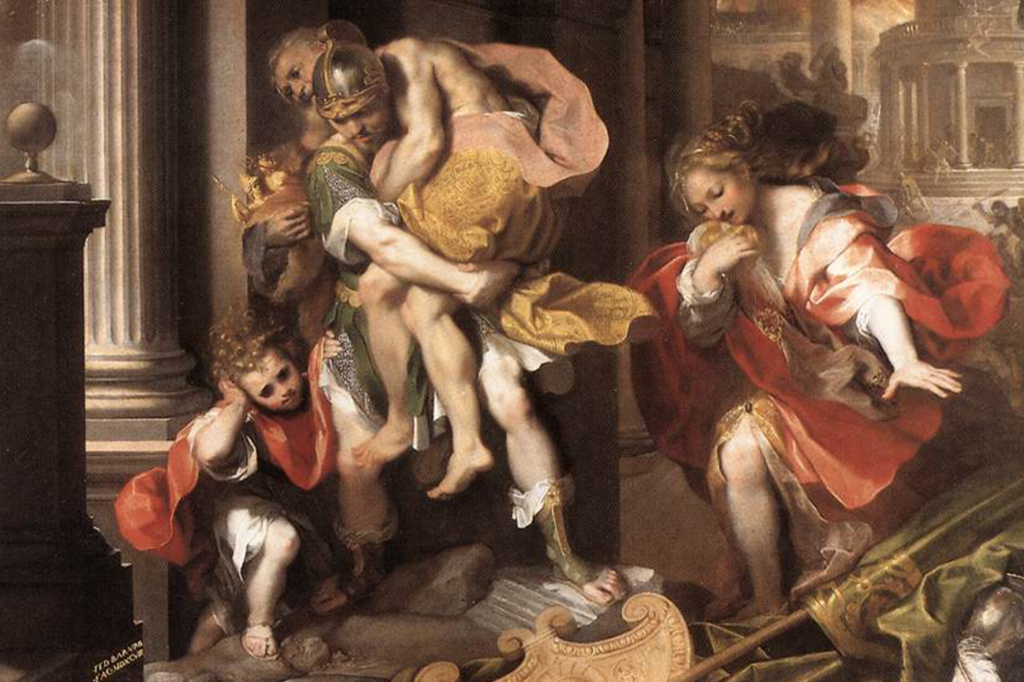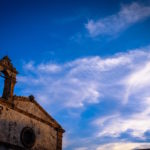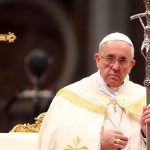In early April, Austen Ivereigh published an interview with Pope Francis in which he asked for some reflections on the worldwide COVID-19 pandemic. The text appeared in the Spanish newspaper ABC, and in English translation in the British Catholic journal The Tablet and the American periodical Commonweal. During the interview, the pope made two fascinating references to Virgil’s great epic poem about the founding of Rome, the Aeneid. The pope’s comments provide an occasion for remembering the value of classic texts in times of crisis.
Virgil’s epic, written in the last years of the first century B.C., tells the story of the journey of Aeneas and his fellow Trojans, who, after the fall of Troy to Greek forces, travel for several years across the Mediterranean, eventually to settle in Italy and found Rome. As we learn from the poem’s introductory lines, Aeneas is “fate’s fugitive, . . . a man much tossed on land and sea by the gods’ force, . . . [who] suffered greatly in war.” The epic is a call to Romans to remember how “great was the task to found the race and the city of Rome.”
The Power of Memory
The pope first cites the Aeneid in response to Ivereigh’s observation about the role of the Church during Milan’s great plague of 1630, when Cardinal Federico Borromeo and other priests ministered to the needs of the people. Pope Francis, after noting the need for contemporary pastors to be close to those who are suffering, says:
Start your day with Public Discourse
Sign up and get our daily essays sent straight to your inbox.The creativity of the Christian needs to show forth in opening up new horizons, opening windows, opening transcendence toward God and toward people, and in creating new ways of being at home. It’s not easy to be confined to your house. What comes to my mind is a verse from the Aeneid in the midst of defeat: the counsel is not to give up, but save yourselves for better times, for in those times remembering what has happened will help us. Take care of yourselves for a future that will come. And remembering in that future what has happened will do you good.
The pope refers to the poem’s beginning—which opens in the middle of the Trojans’ journey—as a great storm, arranged by the goddess Juno, drives the ships of Aeneas and his cohort to the shores of North Africa, near the city of Carthage. The passage that the pope cites comes from the speech Aeneas gives to his companions after they are shipwrecked on the beach:
Oh comrades (for we have known evils like this before), you have suffered worse things: god will give an end even to these. You braved Scylla’s wrath and the cliffs loud-sounding within; you have seen the rocks of the Cyclops; call back your courage and banish sad fear: perhaps you will one day be glad to remember these dangers.
The pope calls to mind Aeneas’s consoling words in order to encourage those suffering from the coronavirus and its effects, telling them not to give up hope, but rather to “save yourselves for better times.” Indeed, in the future, when the present crisis has ended, we might take solace in remembering how we responded now. The power of memory and its salutary effects are important tropes in the pope’s observations.
Aeneas and Odysseus: Different Models of Leadership
The passage also reinforces the pope’s exhortation to pastors about what leadership requires during a crisis. In part the Aeneid concerns how Aeneas develops the character of a Roman leader through being “exercised by the fates.” It is instructive in this respect to compare Aeneas with Odysseus, another famous participant in the Trojan War, and the hero of Homer’s Odyssey. Much of the first half of the Aeneid is modeled after the Odyssey, but there are crucial differences, especially between the two leaders.
At one point in the Odyssey, as Odysseus’s crew, with fear and trembling, prepares to encounter the monsters Scylla and Charybdis, Odysseus observes:
[F]rom the hands of my men in their terror the oars flew, and splashed one and all in the swirl, and the ship stood still where it was, when they no longer plied with their hands the tapering oars. But I went through the ship and cheered my men with gentle words, coming up to each man in turn: “My friends,” said I, “this is not the first time that we have been in danger, and we are in nothing like so bad a case as when the Cyclops shut us up in his cave; nevertheless, my courage and wise counsel saved us then, and we shall live to look back on all this as well.”
Contrast this with the scene when Aeneas encourages his shipwrecked followers by reminding them how they had suffered worse things before, telling them to “call back your courage.” There he concludes with these words: “Through changes and chance, through many perilous choices we sail to Italy, where the Fates show us peaceful homes; there the kingdom of Troy shall arise once more (it is right that it should). Be hard and preserve yourselves for the good times that are to come.” Virgil, the narrator, then comments: “So he spoke, grown sick with enormous cares. In his face he simulates hope, but thrusts sorrow deep back in his heart.” As the epic unfolds, Aeneas will gradually become more confident in his destiny, especially after he visits the underworld and hears from his father a prophecy of Rome’s future. Here, however, Aeneas is unsure of himself; yet he is sure of his men. He talks about their courage, giving them credit for their steadfastness. Odysseus, on the other hand, is unsure of his men and sure of himself. He reminds them of his own courage and skill that saved them from previous dangers.
Here we have two different models of leadership in times of crisis. I think the pope finds in the example set by Aeneas the kind of leadership that is particularly appropriate today.
Taking History under One’s Wings
The pope’s second reference to the Aeneid comes in his response to Ivereigh’s final question. Ivereigh asks the pope for specific reflections about Lent and for a message for the marginalized: the young, the old, and those facing poverty as a result of the crisis. The pope replies:
Those who have been impoverished by the crisis are today’s deprived, who are added to the numbers of deprived of all times, men and women whose status is “deprived.” They have lost everything, or they are going to lose everything. What meaning does deprivation have for me, in the light of the Gospel? It means to enter into the world of the deprived, to understand that he who had, no longer has. What I ask of people is that they take the elderly and the young under their wing, that they take history under their wing, take the deprived under their wing.
To develop this theme of “[taking] history under one’s wings,” the pope cites another passage from the Aeneid—from Aeneas’s account to Dido, queen of Carthage, about what happened before he arrived at her city. This time Pope Francis quotes the Latin verse:
What comes now to mind is another verse of Virgil’s, at the end of Book 2 of the Aeneid, when Aeneas, following defeat in Troy, has lost everything. Two paths lie before him: to remain there to weep and end his life, or to follow what was in his heart, to go up to the mountain and leave the war behind. It’s a beautiful verse. Cessi, et sublato montem genitore petivi (“I yielded, lifted my father [on my shoulders, and] made for the mountain”).
This is what we all have to do now, today: to take with us the roots of our traditions, and make for the mountain.
The Latin passage is the final sentence of Book 2, Aeneas’s own account of the fall of Troy. Since the Greeks now held the city, “there was no hope of rescue,” as Aeneas says; so a group of Trojans joined Aeneas, his son Ascanius, and his father Anchises, and fled. When Aeneas escapes the city, he discovers that his wife has been left behind, and he rushes back to search for her. But she has already died, and he meets her ghost instead. She tells him that the gods have forbidden that she should accompany him, and that his destiny lies elsewhere.
In recounting these events, Aeneas relates his initial desperate reactions to the battle for Troy and the lesson that both his wife Creusa and (in another passage) his goddess-mother Venus taught him: that it is futile to continue to fight for a cause that is lost. Aeneas could have given up and sought to die by continuing to fight hopelessly; but he chooses not to make that fatal lamentation, although he does not abandon the past altogether. He carries his father on his shoulders and takes his son by the hand as he and his followers “make for the mountain,” the first step in a quest that ends with the founding of Rome.
The moral the pope draws from this scene is particularly poignant and illustrates how well he can invoke great literature for its wisdom: “This is what we all have to do now, today,” he says: “to take with us the roots of our traditions, and make for the mountain.”
Gianlorenzo Bernini (1598–1680), the great baroque architect and sculptor, captured in marble this scene of Aeneas with his father and son. The statue is in the Villa Borghese in Rome.
Aeneas is carrying his father and leading his son, an image of what the pope means by caring for both the elderly and the young. The aged Anchises represents the cultural roots that nourish and inspire the founder of Rome; he holds in his hands a representation of the family’s household gods. The young Ascanius foreshadows their future prospects in Italy. Aeneas tells his father “your weight is not heavy:” the past is not a burden.
The Enduring Legacy of the Aeneid
That the pope should invoke the Aeneid as a source of inspiration is not simply a rhetorical flourish. It reflects the profound influence of Virgil’s epic in western culture, an influence that remains even if fewer people have read the poem or are aware of its story. From Augustine to Dante and on to Shakespeare and Milton, the impact of Virgil’s work on later authors has made him one of the founding pillars of the west. T. S. Eliot once stated that Aeneas is the “prototype of a Christian hero.” In his Confessions, Augustine in many ways fashions himself as a Christian Aeneas, as he searches his memory to find how God acted in his life amid a wide array of intellectual and personal troubles. Virgil himself famously serves as Dante’s guide through the Inferno and the Purgatorio; Dante’s journey depends upon the insights of the Roman poet, whom Dante places in the limbo of the “virtuous pagans.”
In responding to the current crisis, the great pandemic, we can follow the example of Aeneas: we can reject despair in the face of horrible suffering and find strength in “the roots of our traditions.” These roots are, for Pope Francis, ultimately a Christian understanding of suffering and a recognition of divine transcendence. But they also include the values of the broad cultural heritage of the West, including the Aeneid. We ought to take the pope’s advice, so that in the future, we will be able to remember that in the midst of our crisis we embraced the values that form the real foundations of who we are.















